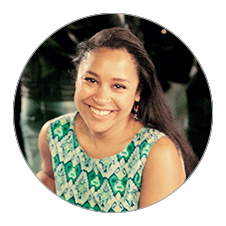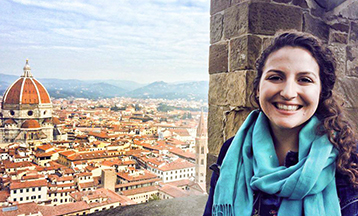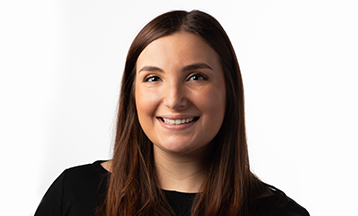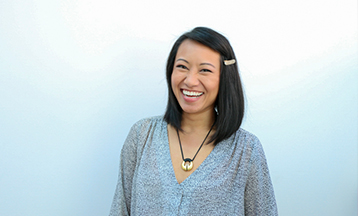-
About
Marist Commencement
Celebrating the Class of 2025
• The graduate ceremony will be held on Friday, May 23.
• The undergraduate ceremony will be held on Saturday, May 24.About
-
Academics
Marist Commencement
Celebrating the Class of 2025
• The graduate ceremony will be held on Friday, May 23.
• The undergraduate ceremony will be held on Saturday, May 24.Academics
-
Admission & Financial Aid
Marist Commencement
Celebrating the Class of 2025
• The graduate ceremony will be held on Friday, May 23.
• The undergraduate ceremony will be held on Saturday, May 24.Admission & Financial Aid
-
Student Life
Marist Commencement
Celebrating the Class of 2025
• The graduate ceremony will be held on Friday, May 23.
• The undergraduate ceremony will be held on Saturday, May 24.Student Life
- Athletics
Students talking in front of posters

Bethany Hucks
Astoria, NYAcademic School
Communication & the ArtsCampus
ItalyBethany Hucks is a member of Marist's M.A. in Museum Studies Class of 2017. She received a Bachelor of Arts in History from Harvard University and is currently a Ph.D. candidate at the University of Heidelberg’s Cluster of Excellence for Asia and Europe, in the field of Transcultural Studies.
Why did you choose to pursue your degree at Marist Italy?
I wanted to do my MA in a French, German, or Italian-speaking nation to improve my language skills, which are required for a Ph.D. Florence is the home of so many different kinds of collections and venues, and the opportunity to study in actual museums was unique. It’s also well-positioned for travel to other places I wanted to visit for research.
Tell us about a project or course that was particularly meaningful to your professional development.
I worked really hard the first semester to learn Italian so I could take a course offered at the University of Florence called ‘Storia delle mostre’ (History of Exhibitions). The things I learned in that class were essential when doing research during my internship for an exhibition about the 19th-20th-century history of a collection because I was already familiar with the development of displays from that time period, archival resources, and how to examine and analyze displays that no longer exist.
Where did you do your internship?
I focus in Egyptology, so I interned at the Museo Egizio in Turin, Italy. It holds one of the best Egyptian collections in the world, and I was able to work on a temporary exhibition from the initial research right through to opening night. It was a wonderful experience but also gave me a chance to turn theory into practice.
Where did you travel during your time in Italy?
I travel regularly for thesis research, which involved a month in Rome, three months in Turin for my internship, and trips within Italy to Naples, Padua, Bologna, Pisa, and other cities. I also travel frequently throughout England and Germany to see collections. I’ve recently been in Barcelona, and I will spend August in Ireland and Cyprus.
What was your favorite place in Florence and why?
I like to hike past the famous Piazzale Michelangelo to the church of San Miniato al Monte. It was begun in the early 11th century and is still a working monastery, where the monks sing vespers every evening. The church and grounds are beautiful, and there is an incredible view over the city of Florence. It’s atop quite a steep hill, but there is a bus (plus gym memberships are expensive here, so it’s a great workout!). Also, there is a small daily farmer’s market (until 1 pm) in Santo Spirito where the old Italian grandmas come to buy their produce. Shopping with them always makes me feel more like a local.
What is your least favorite aspect of living in Florence and why?
I stayed in Florence for an additional year after most of my cohort left the city. Florence can be lonely because so many people are short-term residents, so you have to work hard to make local friends. It’s worth the effort though; the friendships I’ve made in Florence will last a lifetime.
What advice would you give to a student considering pursuing their master’s degree at Marist/LdM?
If you know you want to work in, for example, museum education, curation, or development early on, find ways to incorporate your interest in that area into every research paper or project. Doing this will help you become a subject matter expert, but is also very useful for developing a thesis topic. The earlier the better!
Are you currently employed or furthering your education?
I have been accepted as a Ph.D. candidate at the University of Heidelberg’s Cluster of Excellence for Asia and Europe, in the field of Transcultural Studies. I’ll be studying the ways Romans collected different types of objects from Egypt or made in Egyptian style during the Imperial period. I hope to work as a curator after completing a Ph.D.
How has the Museum Studies program helped you get where you are today?
I had an idea of the field in which I wanted to specialize (Egyptology) as a curator, but writing about Egyptological displays and collections from many different points of view helped me find a unique specialization within the field that I will continue to study in my upcoming Ph.D. Without the opportunity to discuss and develop these ideas with my professors, in front of my peers, and with other professionals in the field my vague general interest would not have been honed enough to pass the rigorous Ph.D. application process.
Do you have any advice for students who are looking into pursuing a career in a Museum?
This program works really well for people who aren’t sure exactly which field within museum studies they intend to pursue because it exposes you to many different career paths. However if like me, you do know in advance what you intend to focus on, there are many opportunities to meet people in your field and to really understand how to develop your career path. My advice is this: once you know what you want, don’t be afraid to be aggressive about contacting the people that can help you. In my experience, they are usually very happy to mentor emerging professionals.



